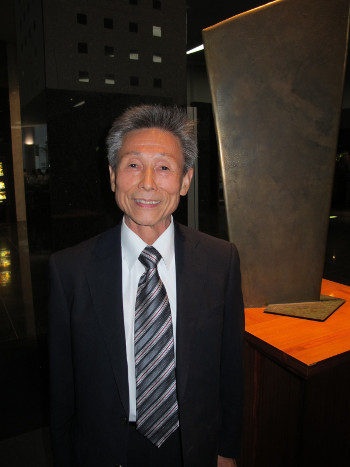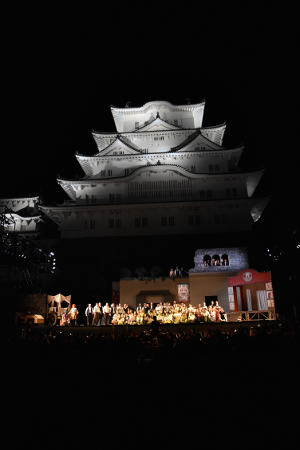Recently in Interviews
‘A brief history of song’ is the subtitle of the 2020 Oxford Lieder Festival (10th-17th October), which will present an ambitious, diverse and imaginative programme of 40 performances and events.
‘Signor Piatti in a fantasia on themes from Beatrice di Tenda had also his triumph. Difficulties, declared to be insuperable, were vanquished by him with consummate skill and precision. He certainly is amazing, his tone magnificent, and his style excellent. His resources appear to be inexhaustible; and altogether for variety, it is the greatest specimen of violoncello playing that has been heard in this country.’
Eboracum Baroque is a flexible period instrument ensemble, comprising singers and instrumentalists, which was founded in York - as its name suggests, Eboracum being the name of the Roman fort on the site of present-day York - while artistic director Chris Parsons was at York University.
‘There could be no happier existence. Each morning he composed something beautiful and each evening he found the most enthusiastic admirers. We gathered in his room - he played and sang to us - we were enthusiastic and afterwards we went to the tavern. We hadn’t a penny but were blissfully happy.’
When soprano Eleanor Dennis was asked - by Ashok Klouda, one of the founders and co-directors of the Highgate International Chamber Music Festival - to perform some of Beethoven’s Scottish Songs Op.108 at this year’s Festival, as she leafed through the score to make her selection the first thing that struck her was the beauty of the poetry.
“At the start, one knows ‘bits’ of it,” says tenor Mark Padmore, somewhat wryly, when I meet him at the Stage Door of the Royal Opera House where the tenor has just begun rehearsals for David McVicar’s new production of Death in Venice, which in November will return Britten’s opera to the ROH stage for the first time since 1992.
“Trust me, I’m telling you stories …”
When British opera director Nina Brazier tries to telephone me from Frankfurt, where she is in the middle of rehearsals for a revival of Florentine Klepper’s 2015 production of Martinů’s Julietta, she finds herself - to my embarrassment - ‘blocked’ by my telephone preference settings. The technical hitch is soon solved; but doors, in the UK and Europe, are certainly very much wide open for Nina, who has been described by The Observer as ‘one of Britain’s leading young directors of opera’.
“We need to stop talking about ‘diversity’ and think instead about ‘inclusivity’,” says Bill Bankes-Jones, when we meet to talk about the forthcoming twelfth Tête à Tête Opera Festival which runs from 24th July to 10th August.
The young Hong Kong-born British composer Dani Howard is having quite a busy year.
For Peter Sellars, Mozart’s Idomeneo is a ‘visionary’ work, a utopian opera centred on a classic struggle between a father and a son written by an angry 25-year-old composer who wanted to show the musical establishment what a new generation could do.
“Physiognomy, psychology and technique.” These are the three things that determine the way a singer’s sound is produced, so Ken Querns-Langley explains when we meet in the genteel surroundings of the National Liberal Club, where the training programmes, open masterclasses and performances which will form part the third London Bel Canto Festival will be held from 5th-24th August.
“Sop. Page, attendant on the King.” So, reads a typical character description of the loyal page Oscar, whose actions, in Verdi’s Un ballo in maschera, unintentionally lead to his monarch’s death. He reveals the costume that King Gustavo is wearing at the masked ball, thus enabling the monarch’s secretary, Anckarstroem, to shoot him. The dying King falls into the faithful Oscar’s arms.
A mournful Princess forced by her father into an arranged marriage. A Prince who laments that no-one loves him for himself, and so exchanges places with his aide-de-camp. A melancholy dreamer who dons a deceased jester’s motley and finds himself imprisoned for impertinence.
‘Aloneness’ does not immediately seem a likely or fruitful subject for an opera. But, loneliness and isolation - an individual’s inner sphere, which no other human can truly know or enter - are at the core of Yasushi Inoue’s creative expression.
What links Wagner’s Das Rheingold, Donizetti’s Anna Bolena, Mozart’s Don Giovanni and Cavalli’s La Calisto? It sounds like the sort of question Paul Gambaccini might pose to contestants on BBC Radio 4’s music quiz, Counterpoint.
Though she won praise from the literary greats of her day, including Thomas Hardy, Virginia Woolf, Ezra Pound and Siegfried Sassoon, the Victorian poet Charlotte Mew (1869-1928) was little-known among the contemporary reading public. When she visited the Poetry Bookshop of Harold Monro, the publisher of her first and only collection, The Farmer’s Bride (1916), she was asked, “Are you Charlotte Mew?” Her reply was characteristically diffident and self-deprecatory: “I’m sorry to say I am.”
“It lives!” So cries Victor Frankenstein in Richard Brinsley Peake’s Presumption: or the Fate of Frankenstein on beholding the animation of his creature for the first time. Peake might equally have been describing the novel upon which he had based his 1823 play which, staged at the English Opera House, had such a successful first run that it gave rise to fourteen further adaptations of Mary Shelley’s 1818 novella in the following three years.
It sounds like a question from a BBC Radio 4 quiz show: what links Handel’s cantata for solo contralto, La Lucrezia, Samuel Beckett’s Krapp’s Last Tape, and the post-punk band Joy Division?
The first two instalments of the Academy of Ancient Music’s ‘Purcell trilogy’ at the Barbican Hall have posed plentiful questions - creative, cultural and political.
Interviews

20 Oct 2015
Atsuto Sawakami — Sponsor of Italian Opera in Japan
Atsuto Sawakami is a slightly built man in his late sixties with impeccable, gentlemanly manners. He communicates a certain restless energy and his piercingly bright eyes reveal an undimmed appetite for life.
He is Japan’s most important private sponsor of opera. His Sawakami Opera Foundation bankrolls the Kyoto Opera Festival, which, having started
modestly in 2013 – “it was so tiny” he recalls – has now grown to the point where it is about to be renamed the Japan Opera
Festival. It reached Tokyo this year and will offer productions in other Japanese cities in the future. The most exciting new development on Japan’s
operatic scene for a long time, the Festival’s basic principle is to import large numbers of Italian musicians, to slightly supplement them with
local music forces, and to stage Italian operas at locations of outstanding historical and cultural significance. This year two of the four performances of Pagliacci were presented immediately under the keep of Himeji Castle – Japan’s most famous castle and one of its most iconic
buildings. I was able to interview Mr. Sawakami for forty-five minutes on September 14, the day after the first performance of the Festival (which took
place in the grounds of the Kyoto National Museum). He is clearly a very busy man, but at the same time eager to talk enthusiastically about what his
Foundation is doing.
 Cast of Pagliacci under Himeji Castle
Cast of Pagliacci under Himeji Castle
Somewhat surprisingly, Sawakami tells me that until about eight years ago he had no special interest in opera; he has always enjoyed listening to Western
classical music, but only “a small part” of that was opera. It was the development of his friendship with a promising young Japanese conductor
called Hirofumi Yoshida that caused this to change. Yoshida was building a career in Italy, primarily as a conductor of opera, and he invited Sawakami to
Europe to experience “true” Italian opera. The latter recalls the conductor at that time with obvious affection, “still fighting to be
successful in Italy … living in a very shabby room.” Sawakami greatly admired Yoshida’s determination to make his mark at the
international level and was rapidly convinced that Italian opera was one of the world’s great cultural treasures. Soon he was making three or four
trips to Italy a year. One day Yoshida approached him with a startling suggestion: why not organize a festival of Italian opera in Japan? Yoshida thought
it could be developed, in time, into something like the European opera festivals.
Sawakami’s background is in asset management. “I have forty-five years of experience in global investment,” he tells me, modestly hinting
that few of his erstwhile business rivals have managed to survive so long. But his asset management company encourages customers to do something productive
with their wealth, and he is particularly keen to encourage cultural initiatives: “a better society means culture.” Thus Yoshida’s
proposal received a warm welcome and the Opera Foundation was established. In 2013, two intermezzos by Padre Martini were performed; in 2014, Madama Butterfly. Sawakami and Yoshida clearly work together very well; they never argue, the former tells me. Yoshida makes all the artistic
decisions, including choice of opera, director and performers. Sawakami sums up his own principal contribution with a smile: “I say OK. And then I
pay.” It gets expensive. This year, most of the Filarmonica del Teatro Comunale of Bologna, five of Pagliacci’s six principals (the
exception being Motoharu Takei’s Peppe), fifty-four chorus members and various administrative and support staff, including director Gabriele
Marchesini, were flown over from Italy. Their travel and accommodation costs were paid, in addition to their salaries. I suggest that it must be a great
holiday for the Italians; Sawakami laughs and says “yes! And a great headache for us!”
I put it to him that it would surely be a lot more cost effective to make greater use of Japanese musicians. Sawakami devotes some time to explaining that
the Festival is not interested in saving, or making, money. This is about art – “pure art” he emphasizes. He and Yoshida believe
that levels of performance are still higher in Italy: “the top level is the top level … But we’re glad to see the Japanese level coming
up.” With most of the singers coming from Italy, the productions can be rehearsed there before being brought to Japan and incorporating the few
Japanese performers, the latter being selected through a public audition. On the other hand, Sawakami is very critical of the commercialism that comes into
opera when productions are organized around, and promoted on the basis of, star singers. He wants the Festival operas to be appreciated as unified,
artistic wholes, the best of Italian art enjoyed with a corresponding appreciation of Japan’s own cultural heritage.
For the audience, top price seats are expensive, though certainly not excessively so by American or European standards. In any case, there are always
lower-priced seats and, on the day, standing places available for just ¥1,000, or about $8 – “ridiculously cheap” Sawakami says with
pride. Ticketholders get invited to some free events as well, including chamber music recitals. With just four paying performances in this year’s
Festival (there are plans for more in future Festivals), it is impossible not to conclude that the whole project relies very much on his philanthropy. And
as Sawakami talks about the future, it is clear he is less interested in attracting the sort of older, moneyed people who have traditionally supported
opera in Japan than he is in appealing to young people and children; he wants to “broaden the base” of opera in his country and he knows it has
to be affordable for that to happen.
Sawakami is personally very involved in the Festival. He does not just pay the bills. I suggest that after all this exposure to opera, and opera people, he
must have a favorite opera, or opera composer. He laughingly says no, explaining with a level of modesty rare even in Japan that he is “still fairly
amateur in terms of opera … I’m learning now.” His Festival is perhaps above all an invitation for others to learn too.
David Chandler

